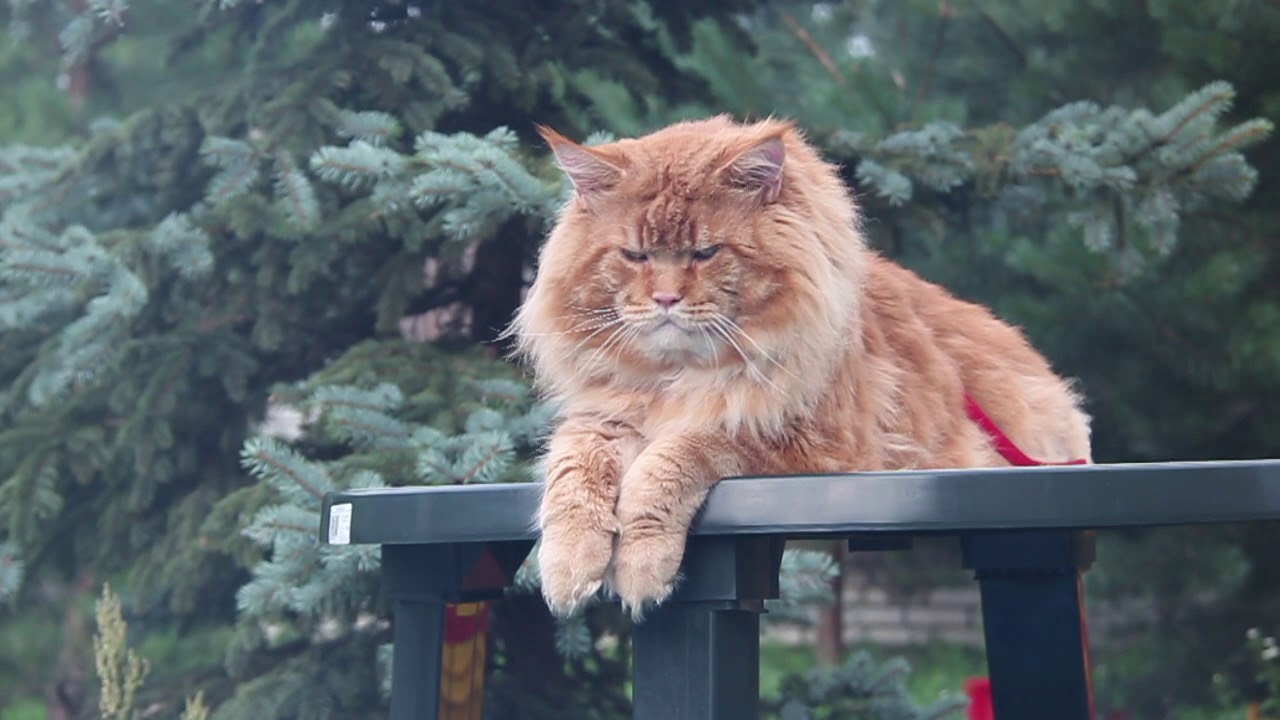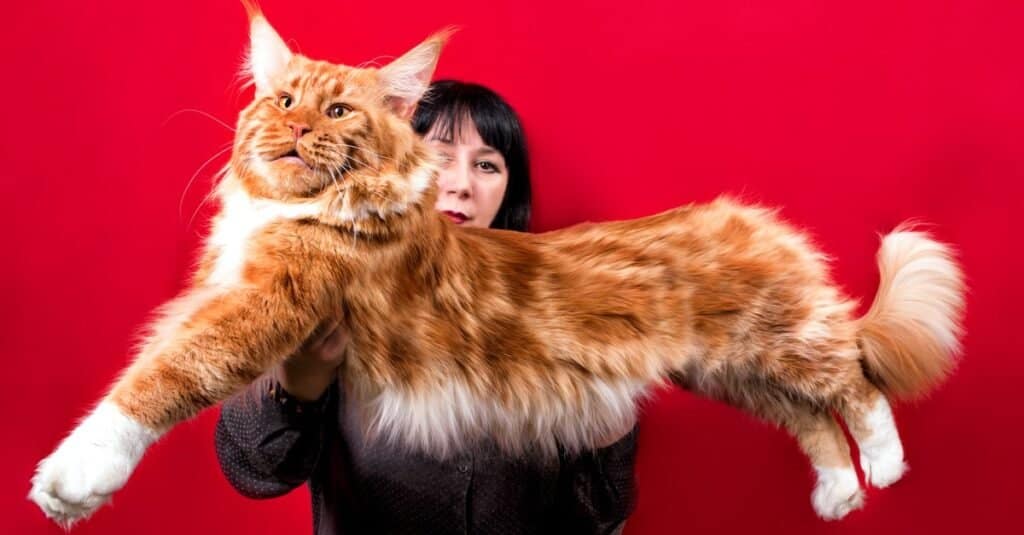So, you’re here to learn about the heaviest Maine Coon cat ever recorded, huh? Well, buckle up because we’re diving deep into the world of these giant furballs. Maine Coons are no ordinary cats—they’re like the gentle giants of the feline kingdom. Known for their massive size, stunning fur, and laid-back personalities, these cats have captured the hearts of cat lovers worldwide. But what happens when one of these majestic creatures grows to record-breaking proportions? Let’s find out.
Imagine this: you walk into your living room, and instead of your average house cat curled up on the couch, there’s a massive Maine Coon that looks like it could take on a small dog. That’s the reality for some lucky (or maybe slightly overwhelmed) cat owners. The heaviest Maine Coon on record is a true marvel of nature, and today, we’ll uncover its story, explore the factors behind its size, and learn what makes these cats so special.
Now, before we dive into the nitty-gritty details, let’s set the stage. Maine Coons are not just big; they’re extraordinary. They’ve been around for centuries, and their history is as fascinating as their size. But when it comes to the heaviest Maine Coon ever recorded, we’re talking about a cat that breaks all the rules. So, whether you’re a lifelong cat enthusiast or just someone who loves fun animal facts, you’re in for a treat.
Read also:Jenavieve Campos The Rising Star Shining Bright In The Spotlight
Table of Contents
- The Record-Breaking Maine Coon
- A Brief History of Maine Coons
- What Makes Maine Coons So Big?
- Caring for a Giant Cat
- Health Concerns for Large Cats
- Nutritional Needs of Maine Coons
- Fun Facts About Maine Coons
- Maine Coons vs. Other Big Cats
- Owning a Maine Coon: What You Need to Know
- Wrapping It Up
The Record-Breaking Maine Coon
Alright, let’s cut to the chase. The heaviest Maine Coon cat on record is none other than Stewie, a giant feline from Reno, Nevada. Stewie weighed in at a whopping 30 pounds, making him a true heavyweight champion in the cat world. But it’s not just his weight that sets him apart; Stewie was also incredibly long, measuring an impressive 48.5 inches from nose to tail. That’s longer than most small dogs!
Stewie’s owner, Barbara Hale, was both proud and amazed by her cat’s size. “He’s like a little tiger,” she once said in an interview. Stewie’s massive frame didn’t slow him down, though. He was known for his playful personality and gentle demeanor, proving that size doesn’t always equal aggression. Unfortunately, Stewie passed away in 2013, but his legacy lives on as the heaviest Maine Coon ever recorded.
How Did Stewie Get So Big?
Now, you might be wondering how a cat can grow to such extraordinary proportions. It’s not just genetics at play here, though that certainly helps. Maine Coons are naturally large cats, but Stewie’s size was also influenced by his diet, lifestyle, and overall health. We’ll dive deeper into these factors later, but for now, just know that Stewie’s growth was a combination of nature and nurture.
A Brief History of Maine Coons
Maine Coons have a rich history that dates back hundreds of years. These cats are believed to have originated in the northeastern United States, specifically in the state of Maine. Their exact origins are a bit of a mystery, but many believe they descended from long-haired cats brought to America by European sailors. Over time, these cats adapted to the harsh climate of Maine, developing thick fur and robust bodies.
One popular legend suggests that Maine Coons are the result of a cross between domestic cats and raccoons. While this is biologically impossible, it’s easy to see why people might think so. Maine Coons have bushy tails and tufted ears that resemble those of raccoons, giving them a wild, adventurous look.
Why Are Maine Coons So Popular?
Today, Maine Coons are one of the most popular cat breeds in the world. Their large size, friendly personalities, and striking appearance make them a favorite among cat lovers. But it’s not just their looks that draw people in; Maine Coons are also known for their intelligence and loyalty. They form strong bonds with their owners and are often described as “dog-like” in their behavior.
Read also:Who Was Bret Michaels Married To A Deep Dive Into The Life And Loves Of A Rock Legend
What Makes Maine Coons So Big?
Let’s talk about the elephant—or should I say, the giant cat—in the room. Why are Maine Coons so much bigger than other domestic cats? There are several factors at play here:
- Genetics: Maine Coons are naturally larger than most other breeds. They have longer bodies, bigger bones, and more muscle mass.
- Diet: A well-balanced diet plays a crucial role in a cat’s growth. Maine Coons require more calories and nutrients than smaller breeds to support their massive frames.
- Lifestyle: Cats that are allowed to roam freely and get plenty of exercise tend to develop stronger muscles and healthier bodies.
- Health: Good health is essential for proper growth. Cats with underlying medical conditions may struggle to reach their full potential size.
Can Any Maine Coon Become a Giant?
While all Maine Coons have the potential to grow large, not every cat will reach record-breaking proportions. Genetics play a significant role, but so do environmental factors. Even if your Maine Coon isn’t the heaviest cat on record, chances are it’s still pretty impressive compared to other breeds.
Caring for a Giant Cat
Having a giant cat like a Maine Coon comes with its own set of challenges. These cats require more food, more space, and more attention than smaller breeds. But don’t worry—with the right care, your Maine Coon can live a long, happy, and healthy life.
Here are a few tips for caring for a large cat:
- Provide a high-quality diet rich in protein and essential nutrients.
- Ensure your cat has plenty of space to move around and stretch its legs.
- Offer interactive toys and activities to keep your cat mentally stimulated.
- Regular vet check-ups are a must to monitor your cat’s health and catch any issues early.
Common Misconceptions About Large Cats
There are a lot of myths out there about large cats, especially Maine Coons. Some people think they’re aggressive or difficult to handle, but nothing could be further from the truth. Maine Coons are known for their gentle, affectionate nature. They may be big, but they’re also incredibly loving and loyal companions.
Health Concerns for Large Cats
While being big and beautiful has its perks, it also comes with some potential health risks. Large cats like Maine Coons are more prone to certain conditions, such as:
- Arthritis: Their larger size puts extra strain on their joints, increasing the risk of arthritis.
- Obesity: Overfeeding can lead to obesity, which can cause a host of other health issues.
- Heart Disease: Maine Coons are prone to a condition called hypertrophic cardiomyopathy, which affects the heart muscle.
It’s important to work closely with your vet to monitor your cat’s health and address any concerns early on.
Preventive Care for Maine Coons
Preventive care is key to keeping your Maine Coon healthy and happy. Regular vet visits, a balanced diet, and plenty of exercise can go a long way in preventing common health issues. Additionally, grooming your cat regularly can help prevent matting and skin problems, which are common in long-haired breeds like the Maine Coon.
Nutritional Needs of Maine Coons
Feeding a Maine Coon can be a bit more challenging than feeding a smaller breed. These cats require more calories and nutrients to support their large size and active lifestyles. Here are some tips for feeding your Maine Coon:
- Choose a high-quality cat food that’s rich in protein and essential nutrients.
- Avoid overfeeding, as this can lead to obesity and other health issues.
- Offer fresh water at all times to keep your cat hydrated.
- Consider supplementing with omega-3 fatty acids to support joint health and maintain a shiny coat.
What to Avoid in Your Cat’s Diet
Just as important as knowing what to feed your cat is knowing what to avoid. Certain foods can be harmful or even toxic to cats, so it’s best to steer clear of them. Some foods to avoid include:
- Chocolate
- Onions and garlic
- Raisins and grapes
- Alcohol
Fun Facts About Maine Coons
Let’s lighten things up with some fun facts about Maine Coons:
- Maine Coons are sometimes called the “dogs of the cat world” because of their loyal and affectionate nature.
- They have a unique voice that’s often described as a chirp or trill rather than a traditional meow.
- Maine Coons can take up to four years to reach their full adult size.
- They’re one of the oldest natural breeds in North America.
Why Are Maine Coons So Cool?
Aside from their impressive size and striking appearance, Maine Coons are just plain cool. They’re intelligent, curious, and always up for an adventure. Whether they’re chasing a toy mouse or lounging on the couch, these cats have a way of making every day feel a little more special.
Maine Coons vs. Other Big Cats
When it comes to big cats, Maine Coons aren’t the only ones in the game. There are several other breeds that can rival their size, including:
- Savannah Cats: A hybrid breed known for its wild appearance and athletic build.
- Norwegian Forest Cats: Another large breed with a thick coat and playful personality.
- Bengal Cats: Known for their striking leopard-like markings and active nature.
While these breeds are all impressive in their own right, Maine Coons hold the title for being the heaviest domestic cat on record.
Which Breed is Right for You?
Choosing the right breed depends on your lifestyle and preferences. If you’re looking for a large, friendly cat with a laid-back personality, a Maine Coon might be the perfect fit. But if you prefer a more active or exotic-looking cat, one of the other big breeds might suit you better.
Owning a Maine Coon: What You Need to Know
Owning a Maine Coon is a rewarding experience, but it’s not without its challenges. These cats require more time, effort, and resources than smaller breeds. Before bringing a Maine Coon into your home, consider the following:
- Do you have enough space for a large cat?
- Are you prepared to provide a high-quality diet and regular vet care?
- Do you have the time and energy to keep your cat entertained and active?
If the answer to these questions is yes, then a Maine Coon might be the perfect addition to your family.
What to Expect from a Maine Coon
Maine Coons are known for their gentle nature and playful personalities. They’re curious, intelligent, and always eager to please. But they’re also independent cats who enjoy their alone time. If you’re looking for a cat that’s both affectionate and self-sufficient, a Maine Coon could be the perfect match.
Wrapping It Up
So, there you have it—the story of the heaviest Maine Coon cat on record and everything you need to know about these magnificent creatures. From their


